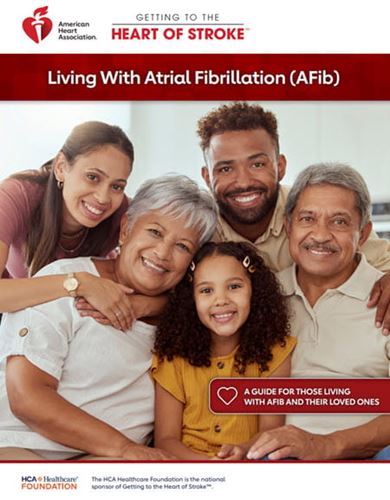Who Is at Risk for Atrial Fibrillation?
Quick Facts
- The chance of having atrial fibrillation (AFib) goes up as you get older.
- Some health problems increase your risk for AFib.
- Some risk factors, such as alcohol and tobacco use, can be controlled.

Are you at risk for atrial fibrillation?
Anyone can develop atrial fibrillation, also called AFib or AF. The chance of AFib goes up with age, and people are living longer. So, experts think many more people will get AFib in the coming years. The risks of heart-related death and stroke go up if you have AFib. Yet, many people don’t realize how dangerous it can be.
Who is at higher risk?
People with one or more of these conditions are usually at higher risk for problems from AFib:
- Older age: The older you get, the higher your risk for AFib. It is rare in children, but it can happen.
- High blood pressure: Long-term, uncontrolled high blood pressure can raise your risk.
- Underlying heart disease: This includes people with:
- Valve problems
- Thickened heart muscle (hypertrophic cardiomyopathy)
- Narrowed or blocked arteries (coronary artery disease)
- A past heart attack
- Recent heart surgery
- Drinking alcohol: Drinking alcohol may raise your risk.
- Smoking: People who smoke have a higher risk of AFib. Quitting tobacco will lower your risk of AFib, stroke and other heart problems.
- Family history: If someone in your family has AFib, you are more likely to get it, too.
- Sleep apnea: Studies show a strong link between obstructive sleep apnea and AFib. Often, treating sleep apnea can improve AFib.
- Athletes: AFib has been commonly reported in elite athletes.
- Not being active: Adding more daily activity can help lower your AFib risk. If you’re concerned about your heart health, talk with your health care professional before exercising.
- Being overweight: If you’re overweight or obese, losing 10% of your body weight can lower your risk.
- Other long-term conditions: People with long-term conditions may be at higher risk. These include:
- Overactive thyroid (hyperthyroidism)
- Type 2 diabetes
- Chronic kidney disease
- Asthma
Factors that aren’t known to affect your risk
- Caffeine: Drinking normal amounts of caffeine won’t increase your risk of AFib. Normal is up to two to four cups of coffee for most adults. But people with AFib may notice their heart racing after drinking caffeine.
- Supplements: Over-the-counter vitamin supplements aren’t known to affect AFib risk. But, do not take them unless your health care professional tells you to.
Video: Maricela Wilson shares her AFib story







